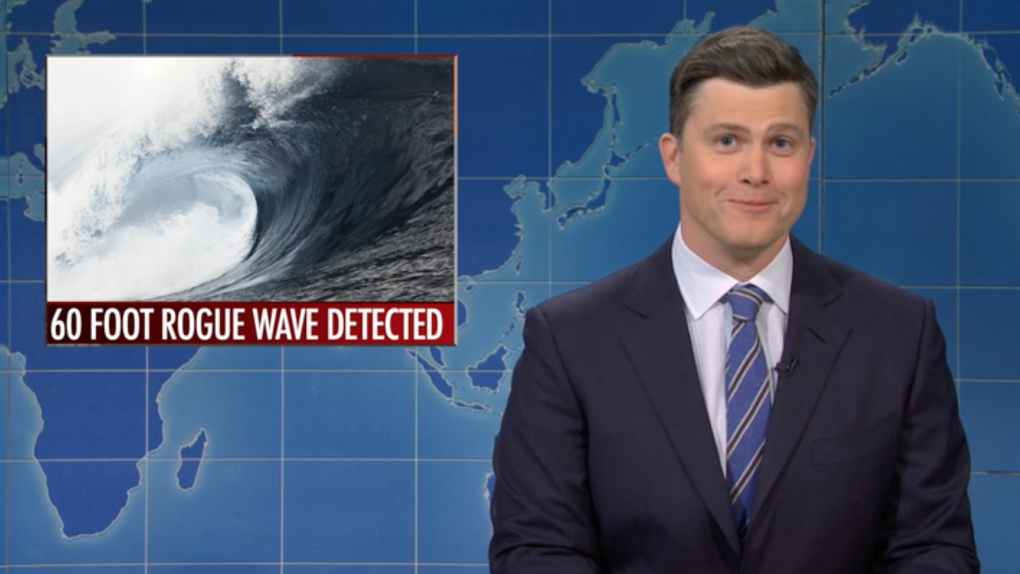Saturday Night Live riffs on record-breaking rogue wave off B.C. coast
 Weekend Update host Colin Jost makes a joke about the rogue wave recorded off Ucluelet, B.C., during the Feb. 26, 2022, episode of Saturday Night Live. (NBC)
Weekend Update host Colin Jost makes a joke about the rogue wave recorded off Ucluelet, B.C., during the Feb. 26, 2022, episode of Saturday Night Live. (NBC)
The record-breaking rogue wave detected off the B.C. coast became fodder for Saturday Night Live's joke writers over the weekend.
The 17.6-metre swell took place near Ucluelet back in November 2020, but made headlines last month thanks to a new research paper from scientists at the University of Victoria, who believe it to be the most extreme rogue wave ever recorded.
The massive wave was reported everywhere from the U.K. to Taiwan before making it onto Saturday Night Live's most recent Weekend Update segment.
"Researchers have observed a nearly 60-foot-tall rogue wave off the coast of British Columbia, which is the largest ever recorded. Researchers believe the wave was generated when yo mama fell overboard," Colin Jost quipped.
The rogue wave wasn't actually the tallest on record – another freak swell detected off Norway back in 1995 reached a height of 25.6 metres.
But the 2020 rogue wave is considered the most extreme because it nearly tripled the height of surrounding six-metre swells, whereas the 1995 rogue wave was surrounded by much larger 12-metre swells.
As for the actual causes of the unpredictable, monstrous waves – those involve a convergence of conditions on the water that experts warn is more likely to take place as a result of climate change.
Rogue waves, which are sometimes known as killer waves, are often formed by two swells meeting while moving at different speeds in different directions, according to the U.S. National Oceanic and Atmospheric Administration.
"As these swells pass through one another, their crests, troughs, and lengths sometimes coincide and reinforce each other. This process can form unusually large, towering waves that quickly disappear," the NOAA website reads.
Sometimes, the conditions result in rogue waves lasting for minutes at a time – which can have deadly consequences for crews on nearby ships, or even bystanders on the shore.
With files from CTV News Vancouver Island's Todd Coyne
CTVNews.ca Top Stories

Canadian team told Trump's tariffs unavoidable right now, but solutions on the table in surprise Mar-a-Lago meeting
During a surprise dinner at Mar-a-Lago, representatives of the federal government were told U.S. tariffs from the incoming Donald Trump administration cannot be avoided in the immediate term, two government sources tell CTV News.
Toronto man accused of posing as surgeon, giving four women injections
A 29-year-old Toronto man has been charged after allegedly posing as a surgeon and providing cosmetic procedures on several women.
Saskatoon priest accused of sexual assault says he meant to encourage young girl with hug and kiss
A Saskatoon priest accused of sexual assault says he meant to encourage and reassure a young girl when he hugged and kissed during his testimony at Saskatoon Provincial Court Friday.
Bob Bryar, drummer for rock band My Chemical Romance, dead at 44
Bob Bryar, former drummer for the band My Chemical Romance, has died. He was reportedly 44.
Trump threatens 100% tariff on the BRIC bloc of nations if they act to undermine U.S. dollar
U.S. president-elect Donald Trump on Saturday threatened 100 per cent tariffs against a bloc of nine nations if they act to undermine the U.S. dollar.
W5 Investigates 'I never took part in beheadings': Canadian ISIS sniper has warning about future of terror group
An admitted Canadian ISIS sniper held in one of northeast Syria’s highest-security prisons has issued a stark warning about the potential resurgence of the terror group.
'Disappointing': Toronto speed camera cut down less than 24 hours after being reinstalled
A Toronto speed camera notorious for issuing tens of thousands of tickets to drivers has been cut down again less than 24 hours after it was reinstalled.
Bruce the tiny Vancouver parrot lands internet fame with abstract art
Mononymous painter Bruce has carved a lucrative niche on social media with his abstract artworks, crafted entirely from the colourful juices of fruits.
Poilievre suggests Trudeau is too weak to engage with Trump, Ford won't go there
While federal Conservative Leader Pierre Poilievre has taken aim at Prime Minister Justin Trudeau this week, calling him too 'weak' to engage with U.S. president-elect Donald Trump, Ontario Premier Doug Ford declined to echo the characterization in an exclusive Canadian broadcast interview set to air this Sunday on CTV's Question Period.
































